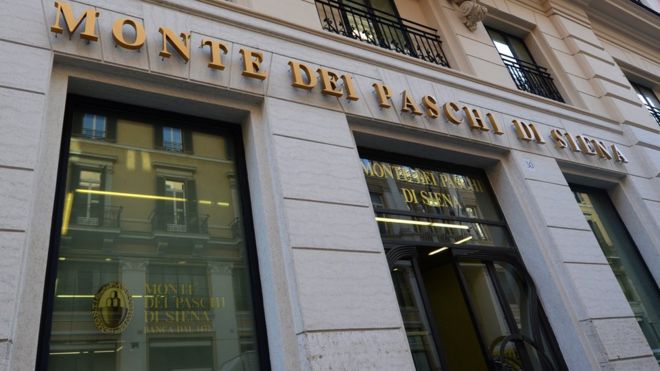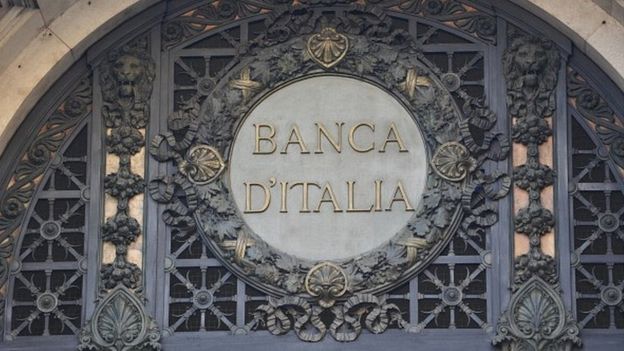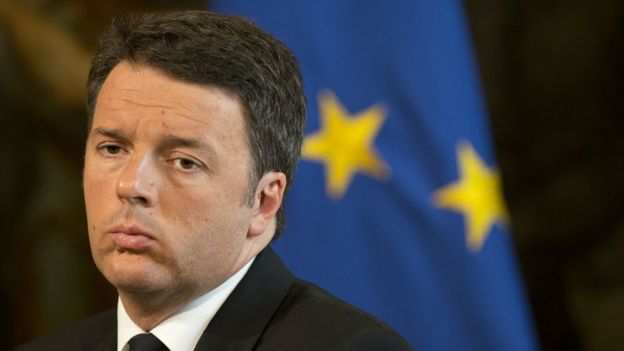- 10 July 2016
- Business
 AFP
AFP
Italy's banks are the latest trouble spot for the eurozone.
They are struggling with a burden of bad debt, loans that are unlikely ever to be repaid fully.
They are a potential flashpoint in an economy that has for some time been seen as posing wider risks to the EU's currency area.
Meanwhile, the Italian government is considering a banking sector bailout which could breach European Union rules.
It's the size of the Italian economy and its government debt that makes the country a smouldering financial volcano. The risks are aggravated by the political situation.
It's the third-largest economy in the eurozone. The government debt burden,depending on which figures you look at, is certainly one of the largest in the eurozone, indeed the largest by one measure.
One of the roots of the problem is Italy's two decades of dismal economic performance. Measured by total economic activity (gross domestic product or GDP), the economy remains about 8% smaller than it was at the onset of the international financial crisis. It is roughly the same size as it was at the turn of the century.
That has made it harder to generate the tax revenue needed to keep the debt burden down. It has also increased the chances of businesses getting into difficulty and being unable to maintain their loan payments.
The result: Italian banks are weighed down with a massive problem of bad debts, or non-performing loans (NPLs), worth €360bn (£307bn), equivalent to about a fifth of the country's annual economic activity.
Heavy losses
The problem has been exacerbated by the country's bankruptcy legislation, which made it very slow for lenders to get their money back when a borrower failed financially. The law has been changed under the government of Matteo Renzi, but it has taken time to make itself felt in practice.
One way that banks can deal with problem loans is to sell them to other investors. But the delays in the foreclosure procedures that enable creditors to recover the money mean these deals involve deep discounts.
 GETTY IMAGES
GETTY IMAGES
That, in turn, would mean the banks would have to acknowledge heavy losses in their accounts, further undermining their financial foundations.
One of the banks at the centre of this crisis is the world's oldest and Italy's third-largest: Banca Monte dei Paschi di Siena. It has been ordered by the European Central Bank to reduce its holdings of bad debt.
At best, the NPL problem inhibits the banks' ability to provide the new credit that Italian businesses need to generate a more convincing economic recovery.
At worst, there is risk that the failure of a large bank could set off a wider financial crisis and a set the recovery back more severely.
The share prices of Italian banks are down sharply, Banca Monte dei Paschi di Siena by more than three-quarters this year.
So the Italian government is considering a bailout. The trouble is that European Union rules, agreed in the wake of the financial crisis, require a bank's creditors, in particular its bondholders, to take losses before the taxpayer steps in.
Under pressure
It generally makes sense. Bondholders are usually professional investors who can handle losses and are also, in theory, better able to monitor banks and discourage them from taking excessive risks in the first place.
 AP
AP
But in the case of Italy, many of these bonds are owned by retail investors. So following the EU rules and imposing losses on this group would be very unpopular in Italy and many would say unfair.
At a time when Mr Renzi's administration is already under pressure, especially from the eurosceptic Five Star Movement, he is very reluctant to take this political risk. That risk is especially pronounced now, ahead of a referendum he has called on changing the constitution.
There have been some efforts to address the problem using private-sector funds contributed by Italy's stronger banks. Several banks have raised extra capital from the markets. But the problem continued to fester.
So there is a political attraction to bypassing the EU legislation and putting public money directly into the banks.
But the idea gets a frosty reception from Germany's Chancellor, Angela Merkel: "We established specific rules as far as the winding down of banks, the recapitalisation of banks is concerned. And we can't come up with new rules every two years."
The rules are part of a very important project in the eurozone, called banking union. It was a response to the region's financial crisis, intended to make the banks more resilient and to break the malign link between weak banks and financially stressed governments.

No comments:
Post a Comment